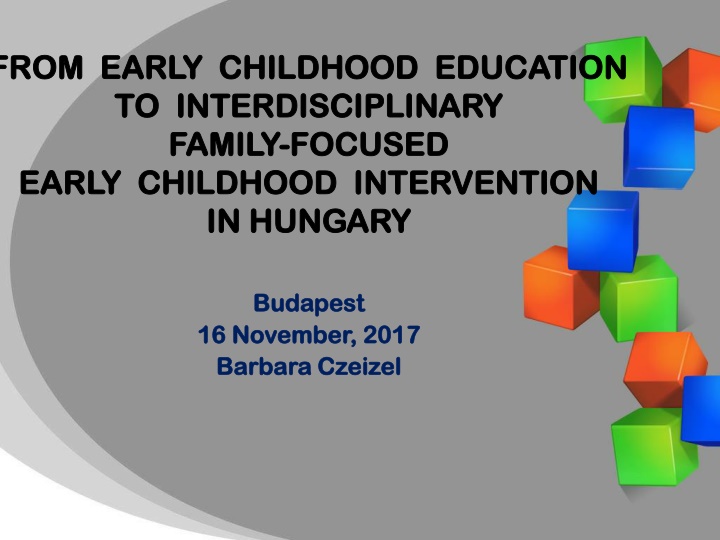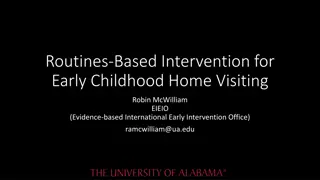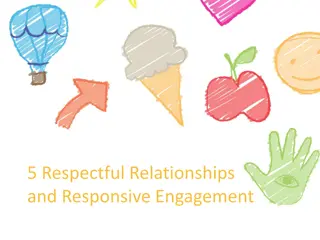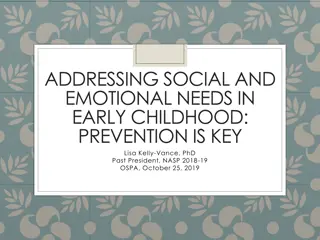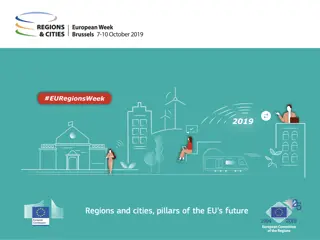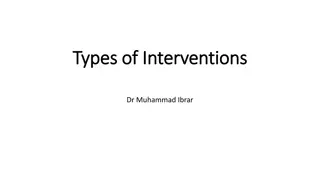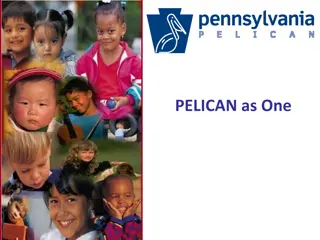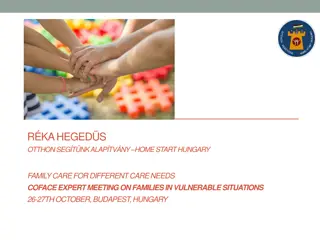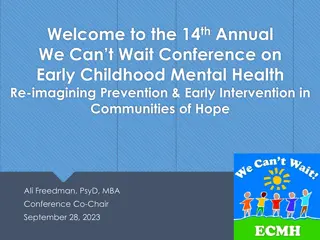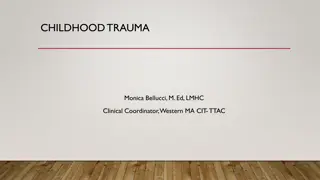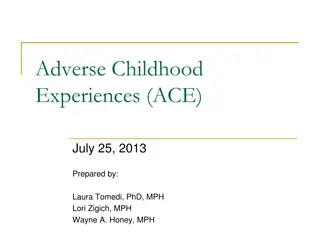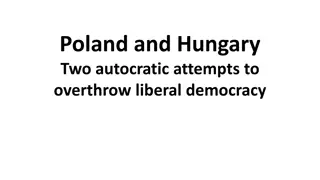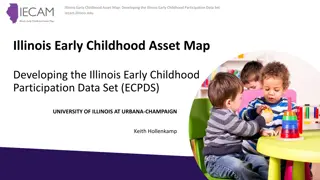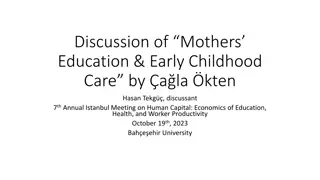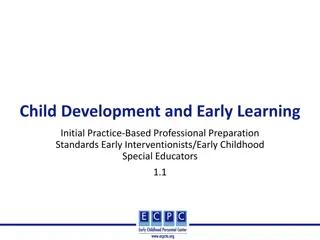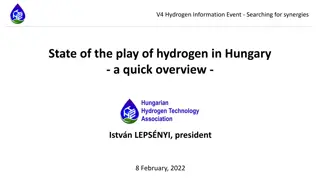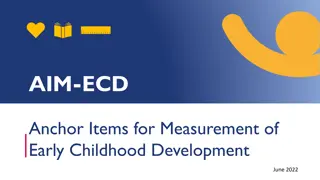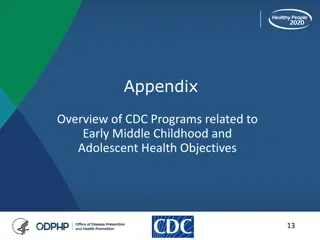Evolution of Early Childhood Intervention in Hungary
Early childhood intervention in Hungary has evolved from an emphasis on early childhood education towards an interdisciplinary, family-focused approach. The sectors involved include healthcare, education, welfare, and family affairs. A wide range of professionals, including health visitors, physicians, therapists, and social workers, collaborate in transdisciplinary teamwork. The focus of early childhood intervention is on providing services and supports to at-risk children and those with developmental delays or disabilities to enhance their development, strengthen family competencies, and promote social inclusion. The definition and legislative history of early childhood development in Hungary underscore the importance of identifying eligibility for services to support child development and family competencies.
Download Presentation

Please find below an Image/Link to download the presentation.
The content on the website is provided AS IS for your information and personal use only. It may not be sold, licensed, or shared on other websites without obtaining consent from the author.If you encounter any issues during the download, it is possible that the publisher has removed the file from their server.
You are allowed to download the files provided on this website for personal or commercial use, subject to the condition that they are used lawfully. All files are the property of their respective owners.
The content on the website is provided AS IS for your information and personal use only. It may not be sold, licensed, or shared on other websites without obtaining consent from the author.
E N D
Presentation Transcript
FROM EARLY CHILDHOOD EDUCATION FROM EARLY CHILDHOOD EDUCATION TO TO INTERDISCIPLINARY INTERDISCIPLINARY FAMILY FAMILY- -FOCUSED FOCUSED EARLY CHILDHOOD INTERVENTION EARLY CHILDHOOD INTERVENTION IN IN HUNGARY HUNGARY Budapest Budapest 16 November, 2017 16 November, 2017 Barbara Czeizel Barbara Czeizel
SECTORS CONCERNED SECTORS CONCERNED IN EARLY EARLY CHILDHOOD CHILDHOOD INTERVENTION IN INTERVENTION Healthcare Education (spec. ed.) Welfare Family Affairs
PROFESSIONALS PROFESSIONALS EARLY CHILDHOOD CHILDHOOD INTERVENTION TRANSDISCIPLINARY TRANSDISCIPLINARY TEAMWORK TEAMWORK, , INTERDISCIPLINARY IN IN EARLY INTERVENTION INTERDISCIPLINARY VIEW VIEW health visitors, primary care physicians child neurologists, child psychiatrists, child orthopeadists, child ophthalmologist, geneticists, etc. special needs teachers physiotherapists, conductors psychologists perinatal advisors social workers social pedagogues art and animal assisted therapists nursery, pre-school teachers assistants etc.
EARLY CHILDHOOD EARLY CHILDHOOD INTERVENTION UNICEF UNICEF- -WHO, 2012 WHO, 2012 INTERVENTION Early childhood intervention (ECI) children who are at risk or who have been identified as ECI comprises a range of services and supports to ensure and enhance children s personal development strengthen family and promote the social inclusion Examples include specialized services such as: medical; rehabilitation (e.g. therapy and assistive devices); family-focused support (e.g. training and counselling); social and psychological; special education, along with service planning coordination; assistance and support to access mainstream services such as preschool and child-care (e.g. referral). Services can be delivered through a variety clinics, hospitals, early intervention centres, rehabilitation centres, community centres, homes and schools. Early childhood intervention (ECI) programmes programmes are designed to support young at risk of developmental delay, identified as having developmental delays or disabilities. range of services and supports children s personal development and resilience, family competencies social inclusion of families and children competencies, through a variety of settings of settings including health-care
DEFINITION OF EARLY CHILDHOOD DEFINITION OF EARLY CHILDHOOD DEVELOPMENT IN HUNGARIAN LEGISTLATION DEVELOPMENT IN HUNGARIAN LEGISTLATION History History of of ECI ECI legistlation legistlation in in Hungary Hungary 1993 1993- -2017 2017 The duty of special and (hereinafter referred to as early development, education and care ) is complex early determination of eligibility for care for the purposes of promoting the development of the child, strengthening the competences of the family and supporting the social inclusion of the child and the family special educational care under Section 18(2) a) of the Act on National Public Education educational co cou uns nsell elling ing, , early early development, development, education education and care complex early childhood childhood prevention, prevention, co cou uns nsell elling ing and and development development from the time of strengthening the competences of the family and supporting the social inclusion of the child and the family. The tasks of early development, education and care special educational, conductive pedagogical counselling, the development of cognitive, social, communication and language skills, as well as development of movement and psychological support. care shall shall be be complex complex
MAJOR GOVERNMENTAL PROGRAMS FOR THE MAJOR GOVERNMENTAL PROGRAMS FOR THE SAKE OF EARLY CHILDHOOD INTERVENTION SAKE OF EARLY CHILDHOOD INTERVENTION Intersectorial Childhood Intersectorial Development of Early Childhood Interventio 2017 (EFOP 1.9.5. VEKOP-16) Development of Early Intervention n 2017- -2021 2021
NEXT STEP NEXT STEP TO INTERVENTION INTERVENTION CARE TO DEVELOP DEVELOP EARLY CARE IN EARLY CHILDHOOD CHILDHOOD IN HUNGARY HUNGARY Intersectorial Childhood Intersectorial Development Childhood Intervention 2017 (EFOP 1.9.5. VEKOP-16) Development of Intervention 2017- -2021 of Early Early 2021
GOAL GOAL OF INTERSECTORAL DEVELOPMENT OF INTERSECTORAL DEVELOPMENT OF OF EARLY EARLY CHILDHOOD CHILDHOOD INTERVENTION INTERVENTION Earliest and professional Earliest possible and toddlers professional and possible recognition toddlers with and partner recognition, , screening with developmental partner- -type screening and risks, , disorders type support and diagnosis disorders and of their diagnosis of and their families of infants infants developmental risks support of families Complex Equal Opportunities, Families and Education) Strongly harmonized cooperation is needed. Child professionals Screenings, assessments, therapies should be well organised so that less children start with disadvantages. Complex area area: affected by several sectors (Health, Welfare, Child s s paths paths should be transparent both for parents and 8
MAIN MAIN ACTIVITIES ACTIVITIES AND PRIORITIES AND PRIORITIES Designate uniform child Elaborate common directives Elaborate system Introduce standardized methods Increase shape their coherent approach Partner Improve accessibility child s s path directives and measuring path and protocols and protocols uniform uniform evaluation standardized and and validated validated screening screening methods and assessment tools competences competences of of professionals professionals, and Partner- -type type cooperation accessibility to services cooperation with with families families 9
Thank Thank you for for your your attention attention. . you judit.barbara.czeizel judit.barbara.czeizel@ @emmi.gov.hu emmi.gov.hu
